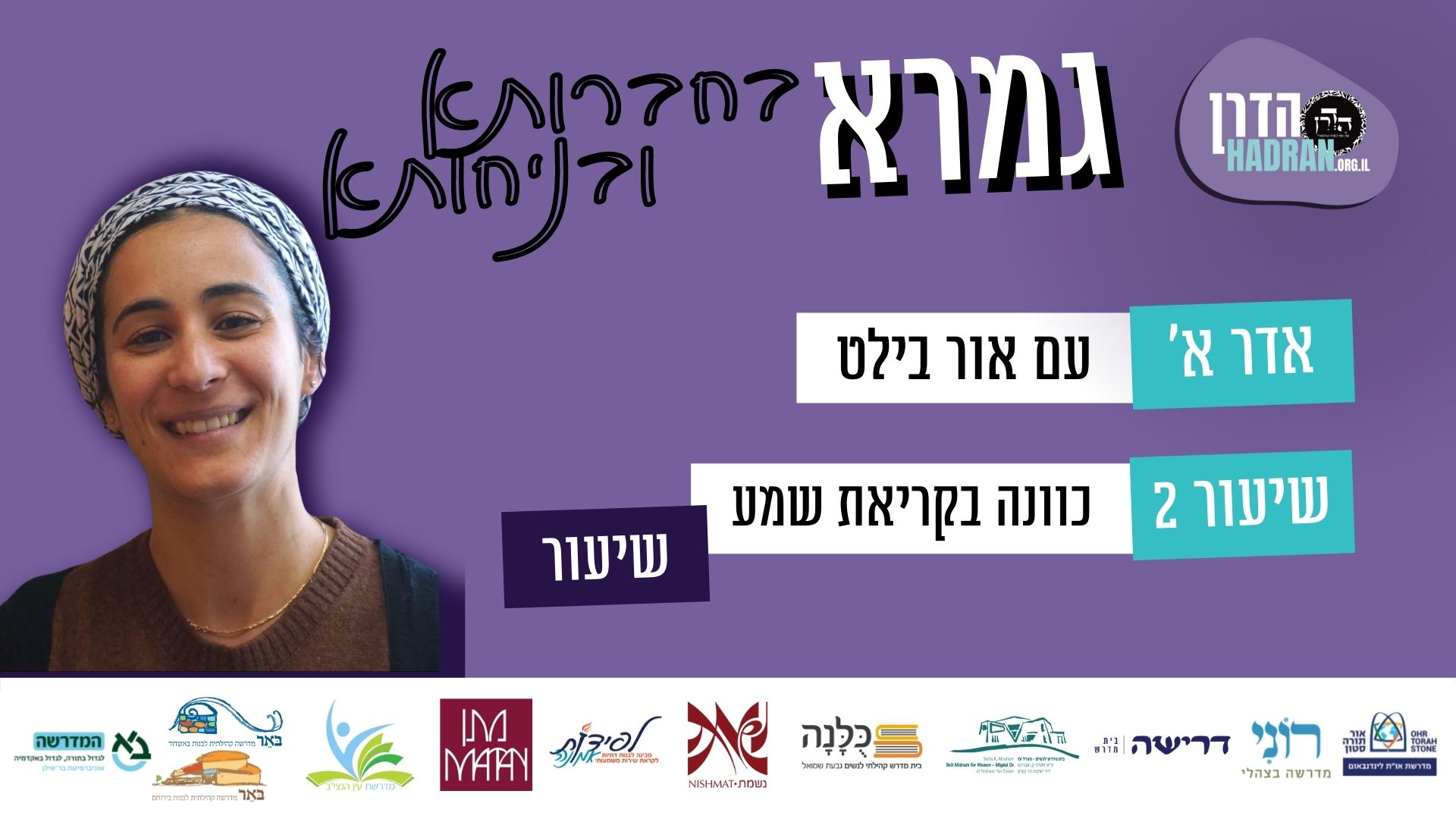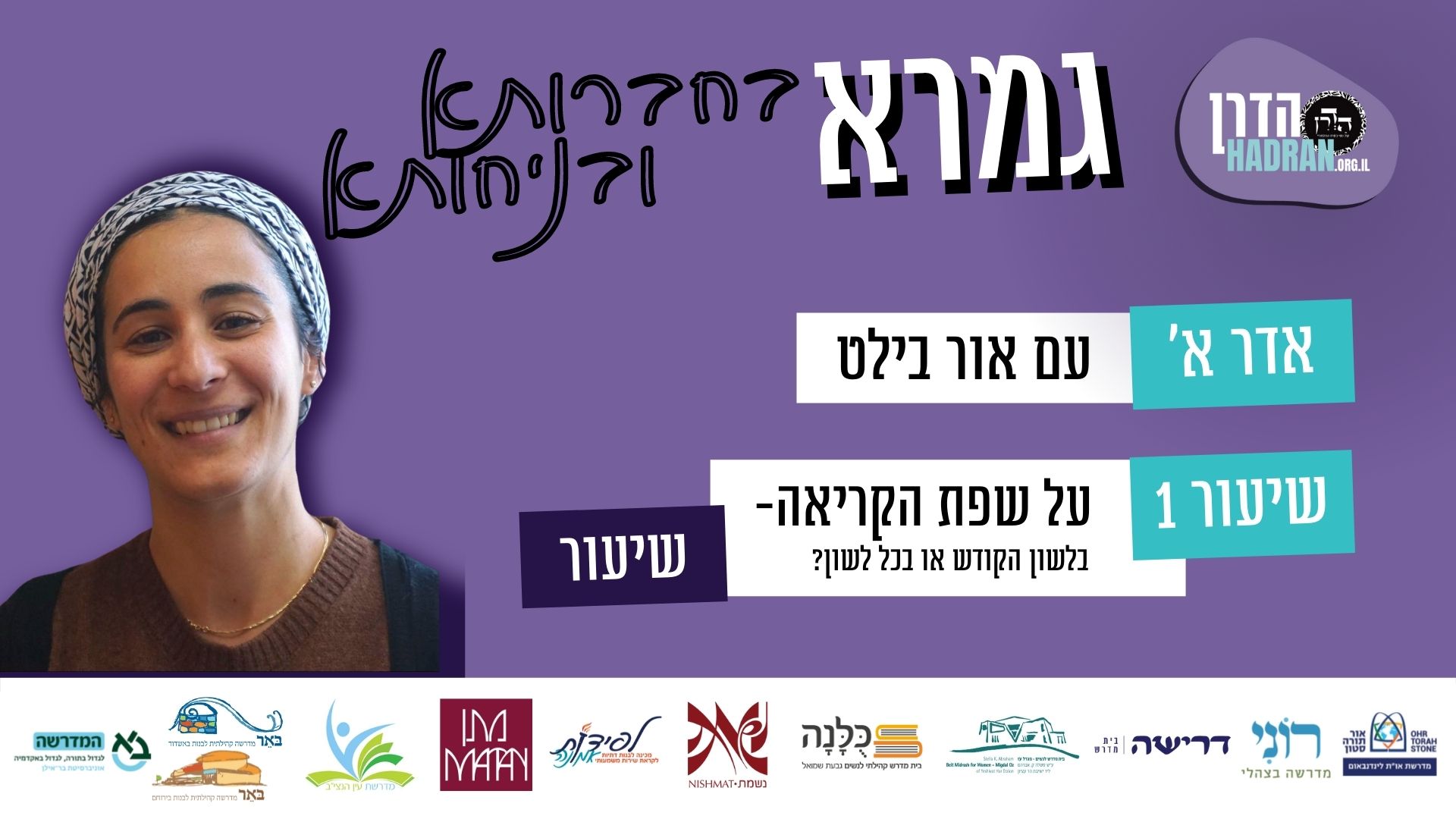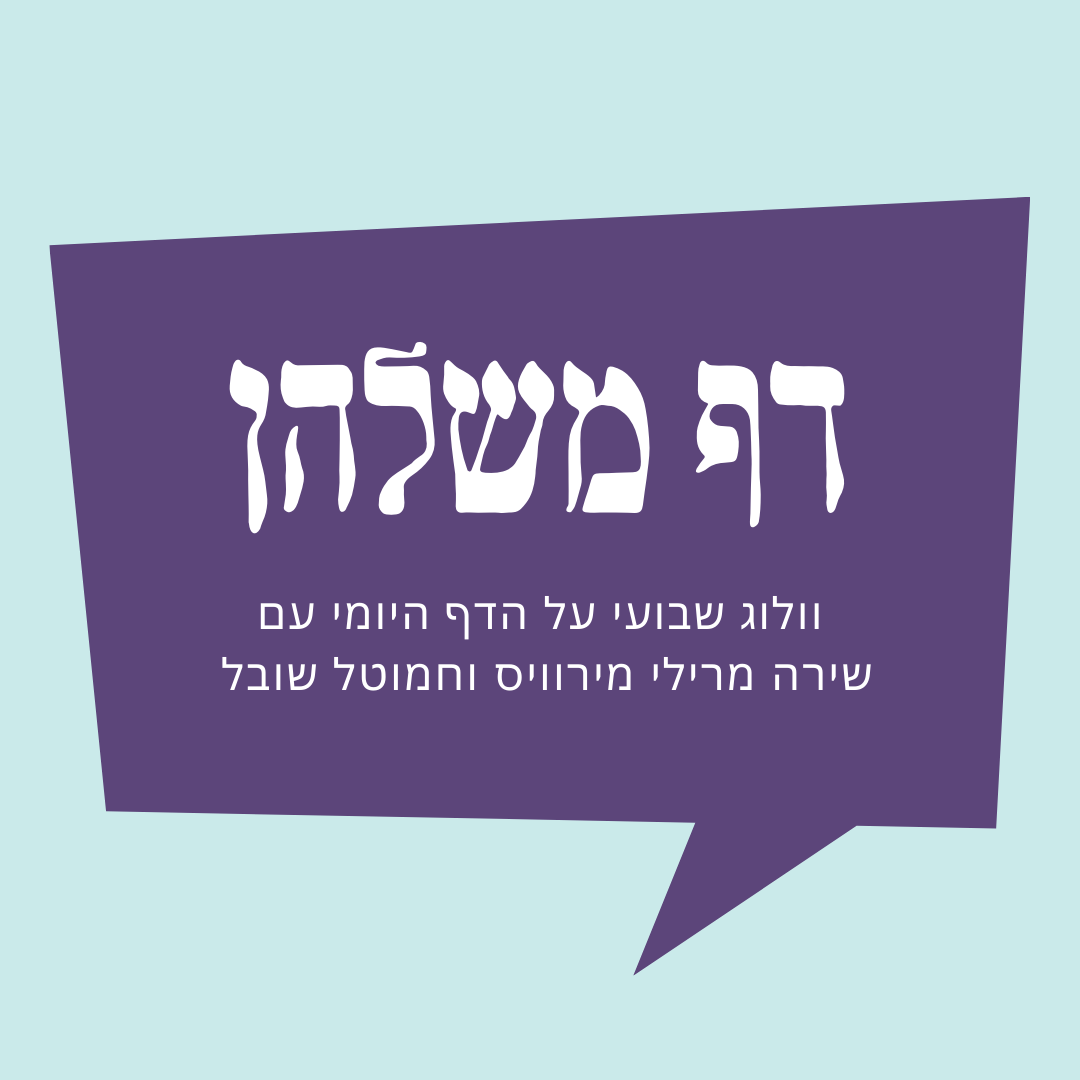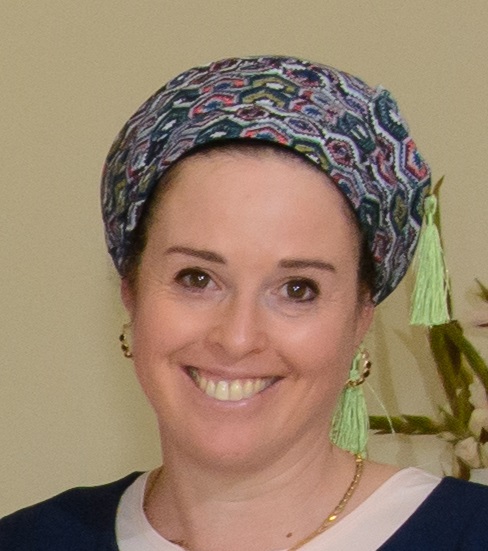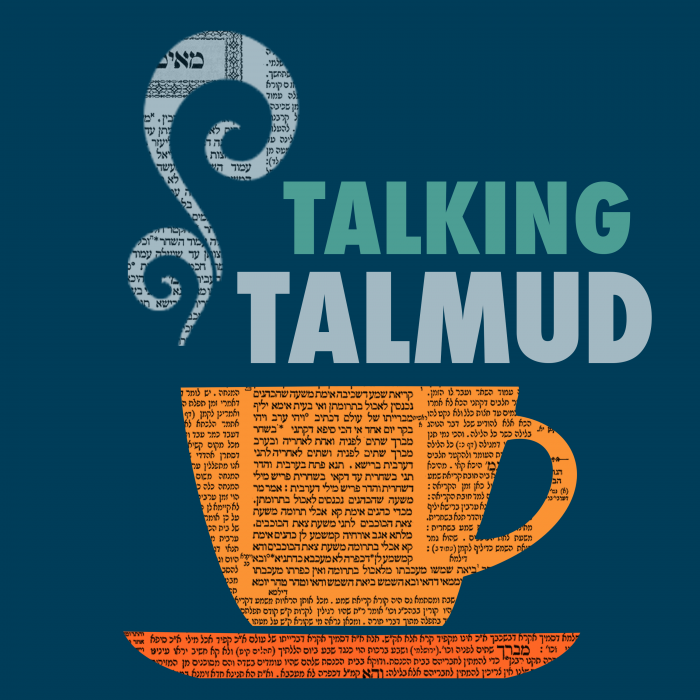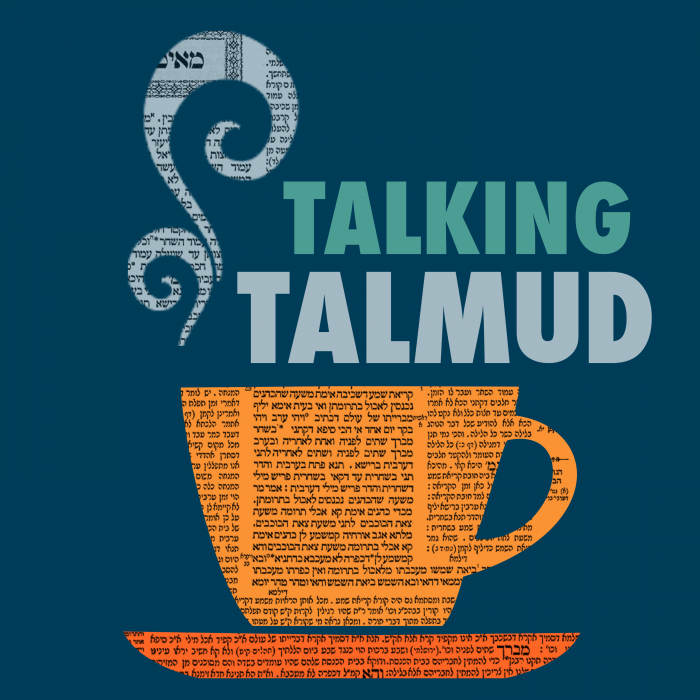מהו הנוסח של ברכת הזימון? הגמרא מביאה ניסוחים בעייתיים. האם קבוצה של אנשים שאכלו יחד יכולים להיחלק לקבוצות קטנות יותר? במה זה תלוי? האם אפשר לזרוק לחם? מהן עוד דרכים לא לזלזל בלחם? האם זה נכון לגבי מאכלים אחרים? מה קורה אם התחילו לאכול בלי לברך – מה עושים?
רוצה להקדיש שיעור?
כלים
העמקה
רוצה להבין מה באמת קורה מתחת לפני השטח של הסוגיה?
שיעורים, פודקאסטים והרחבות של מיטב המורות שלנו יפתחו לך עוד זוויות וכיווני חשיבה.
חדשה בלימוד הגמרא?
זה הדף הראשון שלך? איזו התרגשות עצומה! יש לנו בדיוק את התכנים והכלים שיעזרו לך לעשות את הצעדים הראשונים ללמידה בקצב וברמה שלך, כך תוכלי להרגיש בנוח גם בתוך הסוגיות המורכבות ומאתגרות.
פסיפס הלומדות שלנו
גלי את קהילת הלומדות שלנו, מגוון נשים, רקעים וסיפורים. כולן חלק מתנועה ומסע מרגש ועוצמתי.
ברכות נ
אַף ״בָּרְכוּ״, וּמִכׇּל מָקוֹם ״נְבָרֵךְ״ עֲדִיף, דְּאָמַר רַב אַדָּא בַּר אַהֲבָה, אָמְרִי בֵּי רַב, תְּנֵינָא: שִׁשָּׁה נֶחְלָקִין עַד עֲשָׂרָה.
He may even say: Bless; nevertheless: Let us bless, is preferable as Rav Adda bar Ahava said that they said in the school of Rav: We learned: A group of six to ten people may divide into two groups, each forming its own zimmun. However, a group of ten, which invokes God’s name in the zimmun, may not divide into two groups as that would negate the opportunity to invoke God’s name.
אִי אָמְרַתְּ בִּשְׁלָמָא ״נְבָרֵךְ״ עֲדִיף — מִשּׁוּם הָכִי נֶחְלָקִין, אֶלָּא אִי אָמְרַתְּ ״בָּרְכוּ״ עֲדִיף — אַמַּאי נֶחְלָקִין! אֶלָּא לָאו שְׁמַע מִינַּהּ ״נְבָרֵךְ״ עֲדִיף. שְׁמַע מִינַּהּ.
The Gemara proceeds: Granted, if you say: Let us bless is preferable, that is why six people who ate together may divide into two groups. However, if you say: Bless is preferable, why are they permitted to divide into two groups? Neither group would be able to say: Bless. Rather, mustn’t one conclude from this: Let us bless is preferable as the one reciting the zimmun does not exclude himself from the group? The Gemara sums up the discussion: Indeed, conclude from this that that is the case.
תַּנְיָא נָמֵי הָכִי: בֵּין שֶׁאָמַר ״בָּרְכוּ״ בֵּין שֶׁאָמַר ״נְבָרֵךְ״ — אֵין תּוֹפְסִין אוֹתוֹ עַל כָּךְ, וְהַנַּקְדָּנִין תּוֹפְסִין אוֹתוֹ עַל כָּךְ. וּמִבִּרְכוֹתָיו שֶׁל אָדָם נִיכָּר אִם תַּלְמִיד חָכָם הוּא אִם לָאו. כֵּיצַד? רַבִּי אוֹמֵר: ״וּבְטוּבוֹ״ — הֲרֵי זֶה תַּלְמִיד חָכָם, ״וּמִטּוּבוֹ״ — הֲרֵי זֶה בּוּר.
That was also taught in the Tosefta: Both if he said: Bless, and if he said: Let us bless, we do not reprimand him for doing so; and the punctilious reprimand him for doing so. And the Gemara says: As a rule, from the style of one’s blessings it is obvious whether or not he is a Torah scholar. How so? For example, Rabbi Yehuda HaNasi says: In a zimmun, one who recites: Blessed be the One from Whose food we have eaten and by Whose goodness we live, he is a Torah scholar. However, one who recites: Blessed be the One from Whose food we have eaten and from Whose goodness we live, he is an ignoramus, as that expression insinuates that only some of God’s goodness was bestowed upon him, which is tantamount to a denial of God’s loving-kindness.
אֲמַר לֵיהּ אַבָּיֵי לְרַב דִּימִי: וְהָכְתִיב: ״וּמִבִּרְכָתְךָ יְבֹרַךְ (אֶת) בֵּית עַבְדְּךָ לְעוֹלָם״! — בִּשְׁאֵלָה שָׁאנֵי. בִּשְׁאֵלָה נָמֵי, הָכְתִיב: ״הַרְחֶב פִּיךָ וַאֲמַלְּאֵהוּ״! — הַהוּא, בְּדִבְרֵי תוֹרָה כְּתִיב.
Abaye said to Rav Dimi: Isn’t it written that King David articulated his prayer in that manner: “Be pleased, therefore, to bless Your servant’s house, that it abide before You forever; for You, Lord God, have spoken. And from Your blessing may Your servant’s house be blessed forever” (II Samuel 7:29). David said: From Your blessing. The Gemara answers: In a case of request it is different, as it is inappropriate to demand the full bounty of God’s blessing. The Gemara questions this: In a case of request, too, is it not written that a request for the full bounty of God’s blessing is granted: “Open your mouth wide, that I will fill it” (Psalms 81:11)? What one receives corresponds to what he requests. The Gemara answered: That verse is written with regard to matters of Torah, where it is wholly appropriate to make excessive requests.
תַּנְיָא, רַבִּי אוֹמֵר: ״בְּטוּבוֹ חָיִינוּ״ — הֲרֵי זֶה תַּלְמִיד חָכָם, ״חַיִּים״ — הֲרֵי זֶה בּוּר. נְהַרְבְּלָאֵי מַתְנִי אִיפְּכָא, וְלֵית הִילְכָתָא כִּנְהַרְבְּלָאֵי.
On the topic of the zimmun formula, it was taught in a baraita: Rabbi Yehuda HaNasi says: One who recites in a zimmun: And by His goodness we live, he is a Torah scholar. However, one who recites: And by His goodness they live, he is a fool, as he excluded himself from the collective. The Sages of Neharbela taught the opposite. In their opinion, they live is preferable because it is a more inclusive formula, whereas, we live is more limited and personal. Nonetheless, the Gemara concludes: The halakha is not in accordance with the opinion of the Sages of Neharbela.
אָמַר רַבִּי יוֹחָנָן: ״נְבָרֵךְ שֶׁאָכַלְנוּ מִשֶּׁלּוֹ״ — הֲרֵי זֶה תַּלְמִיד חָכָם, ״לְמִי שֶׁאָכַלְנוּ מִשֶּׁלּוֹ״ — הֲרֵי זֶה בּוּר.
On a similar note, Rabbi Yoḥanan said: One who recites in a zimmun: Let us bless the One Whose food we have eaten, he is a Torah scholar. However, one who recites: Let us bless to Him from Whose food we have eaten, he is an ignoramus, as it appears that the blessing is directed to the host of the meal.
אֲמַר לֵיהּ רַב אַחָא בְּרֵיהּ דְּרָבָא לְרַב אָשֵׁי: וְהָא אָמְרִינַן ״לְמִי שֶׁעָשָׂה לַאֲבוֹתֵינוּ וְלָנוּ אֶת כׇּל הַנִּסִּים הָאֵלּוּ״. אֲמַר לֵיהּ: הָתָם מוֹכְחָא מִילְּתָא, מַאן עָבֵיד נִיסֵּי — קוּדְשָׁא בְּרִיךְ הוּא.
Rabbi Aḥa the son of Rava questioned this and said to Rav Ashi: Don’t we say during the Passover seder: To He Who performed all of these miracles for our ancestors and for us, using the expression: To He Who? Rav Ashi said to him: There, in the case of miracles performed for our ancestors and for us, it is self-evident that the blessing refers to God. Who performs miracles? The Holy One, blessed be He. In the case of food, however, it is not self-evident, as the host of the meal also provided the food that was eaten.
אָמַר רַבִּי יוֹחָנָן: ״בָּרוּךְ שֶׁאָכַלְנוּ מִשֶּׁלּוֹ״ — הֲרֵי זֶה תַּלְמִיד חָכָם, ״עַל הַמָּזוֹן שֶׁאָכַלְנוּ״ — הֲרֵי זֶה בּוּר.
Rabbi Yoḥanan said with regard to the formula of the zimmun that one who recites in a zimmun: Blessed be the One from Whose food we have eaten, he is a Torah scholar. However, one who recites: For the food we have eaten, he is an ignoramus, as it appears that he is blessing the host of the meal. If he was blessing God, why would he restrict the blessing to food (Tosafot)?
אָמַר רַב הוּנָא בְּרֵיהּ דְּרַב יְהוֹשֻׁעַ: לָא אֲמַרַן אֶלָּא בִּשְׁלֹשָׁה, דְּלֵיכָּא שֵׁם שָׁמַיִם, אֲבָל בַּעֲשָׂרָה, דְּאִיכָּא שֵׁם שָׁמַיִם — מוֹכְחָא מִילְּתָא, כְּדִתְנַן: כָּעִנְיָן שֶׁהוּא מְבָרֵךְ, כָּךְ עוֹנִין אַחֲרָיו: ״בָּרוּךְ ה׳ אֱלֹהֵי יִשְׂרָאֵל אֱלֹהֵי הַצְּבָאוֹת יוֹשֵׁב הַכְּרוּבִים עַל הַמָּזוֹן שֶׁאָכַלְנוּ״.
Rav Huna, son of Rav Yehoshua said: We only said this halakha with regard to a zimmun of three, where there is no mention of God’s name. In a zimmun of ten, however, where there is mention of God’s name, it is self-evident to whom the blessing refers, as we learned in our mishna: Just as he recites the blessing, so too do those present recite in response: Blessed be the Lord our God, the God of Israel, the God of Hosts, Who sits upon the cherubs, for the food that we have eaten.
אֶחָד עֲשָׂרָה, וְאֶחָד עֲשָׂרָה רִבּוֹא. הָא גוּפָא קַשְׁיָא, אָמְרַתְּ אֶחָד עֲשָׂרָה וְאֶחָד עֲשָׂרָה רִבּוֹא, אַלְמָא כִּי הֲדָדֵי נִינְהוּ, וַהֲדַר קָתָנֵי בְּמֵאָה אוֹמֵר, בְּאֶלֶף אוֹמֵר, בְּרִבּוֹא אוֹמֵר!
We learned in our mishna with regard to the formula of zimmun: This formula is recited both in a group of ten and in a group of one hundred thousand. The Gemara raises an objection: The mishna itself is difficult. On one hand, you said: This formula is recited both in a group of ten and in a group of one hundred thousand; consequently, the two cases are the same. On the other hand, it is then taught: In a group of one hundred people, the one reciting the zimmun says; in a group of one thousand people, the one reciting the zimmun says; in a group of ten thousand people, the one reciting the zimmun says. Evidently, the formula depends on the number of people.
אָמַר רַב יוֹסֵף: לָא קַשְׁיָא, הָא רַבִּי יוֹסֵי הַגְּלִילִי, הָא רַבִּי עֲקִיבָא. דִּתְנַן, רַבִּי יוֹסֵי הַגְּלִילִי אוֹמֵר: לְפִי רוֹב הַקָּהָל הֵם מְבָרְכִין, שֶׁנֶּאֱמַר: ״בְּמַקְהֵלוֹת בָּרְכוּ אֱלֹהִים״. אָמַר רַבִּי עֲקִיבָא: מַה מָּצִינוּ בְּבֵית הַכְּנֶסֶת וְכוּ׳.
Rav Yosef said: This is not difficult, as these two statements are the opinions of different Sages. This is the opinion of Rabbi Yosei HaGelili, and that is the opinion of Rabbi Akiva. As we learned in our mishna: Rabbi Yosei HaGelili says: According to the size of the crowd, they recite the blessing, as it is stated: “Bless you God in full assemblies, even the Lord, you who are from the fountain of Israel” (Psalms 68:27). We also learned in our mishna that Rabbi Akiva said that there are no distinctions based on the size of the crowd: What do we find in the synagogue? Both when there are many and when there are few, as long as there is a quorum of ten, the prayer leader says: Bless the Lord. In the case of Grace after Meals as well, the formula remains the same regardless of the number of people participating in the zimmun.
וְרַבִּי עֲקִיבָא, הַאי קְרָא דְּרַבִּי יוֹסֵי הַגְּלִילִי מַאי עָבֵיד לֵיהּ? מִיבְּעֵי לֵיהּ לְכִדְתַנְיָא, הָיָה רַבִּי מֵאִיר אוֹמֵר: מִנַּיִן שֶׁאֲפִילּוּ עוּבָּרִין שֶׁבִּמְעֵי אִמָּן אָמְרוּ שִׁירָה עַל הַיָּם — שֶׁנֶּאֱמַר: ״בְּמַקְהֵלוֹת בָּרְכוּ אֱלֹהִים ה׳ מִמְּקוֹר יִשְׂרָאֵל״. וְאִידַּךְ? מִ״מְּקוֹר״ נָפְקָא.
The Gemara asks: And Rabbi Akiva, what does he do with that verse cited by Rabbi Yosei HaGelili? The Gemara answers: He needs it to derive that which was taught in a baraita: Rabbi Meir says: From where is it derived that even fetuses in their mother’s womb recited the song at the Red Sea? As it is stated in the chapter of Psalms that describes the exodus from Egypt: “In assemblies, bless God, the Lord, from the source of Israel,” and fetuses are included in these assemblies. The Gemara asks: And from where does the other Sage, Rabbi Yosei HaGelili, derive the matter of the singing of the fetuses? The Gemara answers: He derives it from “from the source of Israel,” which he interprets as an allusion to the womb.
אָמַר רָבָא: הֲלָכָה כְּרַבִּי עֲקִיבָא. רָבִינָא וְרַב חָמָא בַּר בּוּזִי אִקְּלַעוּ לְבֵי רֵישׁ גָּלוּתָא. קָם רַב חָמָא וְקָא מְהַדַּר אַבֵּי מְאָה. אֲמַר לֵיהּ רָבִינָא: לָא צְרִיכַתְּ, הָכִי אָמַר רָבָא: הֲלָכָה כְּרַבִּי עֲקִיבָא.
Rava said: The halakha is in accordance with the opinion of Rabbi Akiva. The Gemara recounts that Ravina and Rav Ḥama bar Buzi happened to come to a banquet at the house of the Exilarch. At the end of the meal, Rav Ḥama rose and was seeking to gather a group of one hundred participants in the meal so that the zimmun for one hundred could be recited. Ravina said to him: You need not do so, as Rava declared the following: The halakha is in accordance with the opinion of Rabbi Akiva and the formula remains the same regardless of the number of people participating in the zimmun, as long as there are at least ten.
אָמַר רָבָא: כִּי אָכְלִינַן רִפְתָּא בֵּי רֵישׁ גָּלוּתָא, מְבָרְכִינַן שְׁלֹשָׁה שְׁלֹשָׁה. וְלִיבָרְכוּ עֲשָׂרָה עֲשָׂרָה! — שְׁמַע רֵישׁ גָּלוּתָא וְאִיקְּפַד. וְנִיפְּקוּ בְּבִרְכְּתָא דְּרֵישׁ גָּלוּתָא! — אַיְּידֵי דְּאָוְושׁוּ כּוּלֵּי עָלְמָא, לָא שָׁמְעִי.
The Gemara discusses Rava’s conduct at meals at the house of the Exilarch. Rava said: When we would eat bread at the house of the Exilarch, we would recite the Grace after Meals blessing in groups of three. The Gemara asks: Let them recite the blessing in groups of ten. The Gemara answers: Then the Exilarch would hear and become angry upon seeing a large group of Sages reciting Grace after Meals before he completed his meal. The Gemara asks: Why could they not satisfy their obligation with the Exilarch’s blessing? The Gemara answers: Since everyone is making noise, they do not hear and would not fulfill their obligation.
אָמַר רַבָּה תּוֹסְפָאָה: הָנֵי שְׁלֹשָׁה דְּכָרְכִי רִפְתָּא בַּהֲדֵי הֲדָדֵי, וּקְדֵים חַד מִינַּיְיהוּ וּבָרֵיךְ לְדַעְתֵּיהּ — אִינּוּן נָפְקִין בְּזִמּוּן דִּידֵיהּ, אִיהוּ לָא נָפֵיק בְּזִמּוּן דִּידְהוּ — לְפִי שֶׁאֵין זִמּוּן לְמַפְרֵעַ.
Rabba Tosefa’a said: These three people, who break bread together and one of them went ahead and recited Grace after Meals on his own without a zimmun, they, the other two diners, fulfill their obligation with his participation in their zimmun; he, however, does not fulfill his obligation with his participation in their zimmun because there is no retroactive zimmun, and once he recited his blessing, participating in the zimmun accomplishes nothing for him.
רַבִּי יִשְׁמָעֵאל אוֹמֵר. רַפְרָם בַּר פָּפָּא אִקְּלַע לְבֵי כְּנִישְׁתָּא דַּאֲבִי גִיבָּר, קָם קְרָא בְּסִפְרָא וַאֲמַר ״בָּרְכוּ אֶת ה׳״, וְאִשְׁתִּיק, וְלָא אֲמַר ״הַמְבוֹרָךְ״. אֲוַושׁוּ כּוּלֵּי עָלְמָא: ״בָּרְכוּ אֶת ה׳ הַמְבוֹרָךְ״. אֲמַר רָבָא: פַּתְיָא אוּכָּמָא, בַּהֲדֵי פְּלוּגְתָּא לְמָה לְךָ? וְעוֹד, הָא נְהוּג עָלְמָא כְּרַבִּי יִשְׁמָעֵאל.
The mishna states that Rabbi Akiva holds that in the synagogue, one recites: Bless the Lord, while Rabbi Yishmael said that he recites: Bless the Lord the blessed One. Rafram bar Pappa happened to come to the synagogue of Abei Givar when he rose to read from the Torah scroll and recited: Bless the Lord, and was silent, and did not recite: The blessed One. Because Rafram bar Pappa followed the principle that the halakha is in accordance with the opinion of Rabbi Akiva, and those present were not accustomed to that ruling, everyone in the synagogue cried out: Bless the Lord the blessed One. Rava said to Rafram bar Pappa: You black pot, a fond nickname for a Torah scholar who invests great effort in Torah study and worship of God, why are you involving yourself in this tannaitic dispute? Although Rabbi Akiva and Rabbi Yishmael disagree, Rabbi Yishmael’s formula, in which Rabbi Akiva’s formula is included, is acceptable to both. Furthermore, standard practice is in accordance with the opinion of Rabbi Yishmael.
מַתְנִי׳ שְׁלֹשָׁה שֶׁאָכְלוּ כְּאַחַת — אֵינָן רַשָּׁאִין לֵיחָלֵק. וְכֵן אַרְבָּעָה, וְכֵן חֲמִשָּׁה. שִׁשָּׁה — נֶחְלָקִין, עַד עֲשָׂרָה. וַעֲשָׂרָה — אֵין נֶחֱלָקִין, עַד עֶשְׂרִים.
MISHNA: Three people who ate as one are not permitted to divide and recite Grace after Meals individually; rather, they recite the zimmun together. And the same is true of four who ate together, and the same is true of five. However, a group of six, up to but not including ten people who ate as one, may divide into two groups, each reciting its own zimmun. And a group of ten may not divide into two groups until there are twenty people present. The general principle is that a group may not divide unless the smaller groups will be able to recite the same zimmun formula that the whole group would have recited.
שְׁתֵּי חֲבוּרוֹת שֶׁהָיוּ אוֹכְלוֹת בְּבַיִת אֶחָד, בִּזְמַן שֶׁמִּקְצָתָן רוֹאִין אֵלּוּ אֶת אֵלּוּ — הֲרֵי אֵלּוּ מִצְטָרְפִין לְזִמּוּן, וְאִם לָאו — אֵלּוּ מְזַמְּנִין לְעַצְמָן וְאִלּוּ מְזַמְּנִין לְעַצְמָן.
The mishna states a halakha with regard to two groups joining together: Two groups that were eating in one house, when some members of each group can see each other, they may combine to form a zimmun. And if not, these recite a zimmun for themselves and those recite a zimmun for themselves.
אֵין מְבָרְכִין עַל הַיַּיִן עַד שֶׁיִּתֵּן לְתוֹכוֹ מַיִם, דִּבְרֵי רַבִּי אֱלִיעֶזֶר. וַחֲכָמִים אוֹמְרִים: מְבָרְכִין.
The mishna also speaks of the blessing over wine: One does not recite a blessing over wine until he adds water to it, that is the statement of Rabbi Eliezer. Undiluted wine is too strong to drink and a blessing is inappropriate. And the Rabbis say: Since it is possible to drink undiluted wine, one recites a blessing over it.
גְּמָ׳ מַאי קָא מַשְׁמַע לַן? תְּנֵינָא חֲדָא זִימְנָא, שְׁלֹשָׁה שֶׁאָכְלוּ כְּאַחַת חַיָּיבִין לְזַמֵּן!
GEMARA: At the beginning of the mishna, we learned that three people who ate together may not disperse. The Gemara asks: What does this mishna teach us? We already learned this once: Three people who ate as one are required to form a zimmun.
הָא קָא מַשְׁמַע לַן, כִּי הָא דְּאָמַר רַבִּי אַבָּא אָמַר שְׁמוּאֵל: שְׁלֹשָׁה שֶׁיָּשְׁבוּ לֶאֱכוֹל כְּאַחַת, וַעֲדַיִן לֹא אָכְלוּ — אֵינָן רַשָּׁאִין לֵיחָלֵק.
The Gemara answers: This teaches us that halakha which Rabbi Abba said that Shmuel said: Three individuals who sat to eat as one, and they have not yet begun to eat, nevertheless, they are not permitted to divide and recite Grace after Meals individually.
לִישָּׁנָא אַחֲרִינָא: אָמַר רַבִּי אַבָּא אָמַר שְׁמוּאֵל, הָכִי קָתָנֵי: שְׁלֹשָׁה שֶׁיָּשְׁבוּ לֶאֱכוֹל כְּאַחַת, אַף עַל פִּי שֶׁכָּל אֶחָד וְאֶחָד אוֹכֵל מִכִּכָּרוֹ, אֵינָן רַשָּׁאִין לֵיחָלֵק. אִי נָמֵי כִּי הָא דְּרַב הוּנָא, דְּאָמַר רַב הוּנָא: שְׁלֹשָׁה שֶׁבָּאוּ מִשָּׁלֹשׁ חֲבוּרוֹת, אֵינָן רַשָּׁאִין לֵיחָלֵק.
The Gemara cites another version: Rabbi Abba said that Shmuel said that this is what the mishna teaches: Three individuals who sat to eat as one, even though they do not share a meal, but each and every one of them eats from his own loaf, they are considered a single group in terms of zimmun, and are not permitted to divide. Alternatively, perhaps the mishna comes to teach that halakha of Rav Huna, as Rav Huna said: Three individuals who came from three different groups and sat together to continue their meals also form a zimmun and are not permitted to divide.
אָמַר רַב חִסְדָּא: וְהוּא שֶׁבָּאוּ מִשָּׁלֹשׁ חֲבוּרוֹת שֶׁל שְׁלֹשָׁה בְּנֵי אָדָם.
Rav Ḥisda said: And that is only the halakha in a case where the three individuals came from three groups of three people each, so that each original group was independently obligated to recite the zimmun, and that obligation never lapsed.
אָמַר רָבָא:
Rava qualified this, and said:
וְלָא אֲמַרַן אֶלָּא דְּלָא אַקְדִּימוּ הָנָךְ וְאַזְמוּן עֲלַיְיהוּ בְּדוּכְתַּיְיהוּ, אֲבָל אַזְמוּן עֲלַיְיהוּ בְּדוּכְתַּיְיהוּ — פְּרַח זִימּוּן מִינַּיְיהוּ.
We only said this halakha in a case where those members of the previous groups did not include them in the zimmun in their original place, but in a case where they included them in the zimmun in their original place, their obligation to participate in a zimmun has left them. The obligation incumbent upon these three individuals to form a zimmun stems from their obligation to form a zimmun with the members of their original groups. If their groups already included them in a zimmun, their obligation as individuals has lapsed and they can no longer form another zimmun.
אָמַר רָבָא: מְנָא אָמֵינָא לַהּ — דִּתְנַן: מִטָּה שֶׁנִּגְנְבָה חֶצְיָהּ, אוֹ שֶׁאָבְדָה חֶצְיָהּ, אוֹ שֶׁחֲלָקוּהָ אַחִין אוֹ שׁוּתָּפִין — טְהוֹרָה. הֶחֱזִירוּהָ — מְקַבֶּלֶת טוּמְאָה מִכָּאן וּלְהַבָּא.
In order to explain the general principle contained in this halakhic ruling, Rava said: From where do I derive to say this halakha? As we learned in a mishna: A ritually impure bed, half of which was stolen or half of which was lost, or it was divided by brothers after they inherited it from their father, or was divided by partners, it is ritually pure. This is true with regard to any ritually impure utensil that was broken or divided; it is no longer a utensil and is therefore ritually pure. However, if they restored it and reattached the parts, it is susceptible to ritual impurity from here on.
מִכָּאן וּלְהַבָּא — אִין, לְמַפְרֵעַ — לָא. אַלְמָא, כֵּיוָן דְּפַלְגוּהָ — פְּרַח לַהּ טוּמְאָה מִינַּהּ. הָכָא נָמֵי כֵּיוָן דְּאַזְמוּן עֲלַיְיהוּ, פְּרַח זִימּוּן מִינַּיְיהוּ.
Rava infers: From here on, yes, it is susceptible to ritual impurity, retroactively, no, it does not reassume its previous status of ritual impurity. Apparently, once they divided it, the ritual impurity left it. Although it was restored, it does not reassume its previous status of ritual impurity. Here, too, once they included them in the zimmun, their obligation left them and they do not reassume their previous obligation.
שְׁתֵּי חֲבוּרוֹת וְכוּ׳. תָּנָא: אִם יֵשׁ שַׁמָּשׁ בֵּינֵיהֶם — שַׁמָּשׁ מְצָרְפָן.
The mishna explained the circumstances in which two groups that were eating in one house may combine to form a zimmun. The Gemara adds: It was taught: If there is a common waiter among them, serving both groups, the waiter joins them into a single group, even if they cannot see each other.
אֵין מְבָרְכִין עַל הַיַּיִן. תָּנוּ רַבָּנַן: יַיִן עַד שֶׁלֹּא נָתַן לְתוֹכוֹ מַיִם — אֵין מְבָרְכִין עָלָיו ״בּוֹרֵא פְּרִי הַגֶּפֶן״ אֶלָּא ״בּוֹרֵא פְּרִי הָעֵץ״. וְנוֹטְלִין מִמֶּנּוּ לַיָּדַיִם. מִשֶּׁנָּתַן לְתוֹכוֹ מַיִם — מְבָרְכִין עָלָיו ״בּוֹרֵא פְּרִי הַגֶּפֶן״, וְאֵין נוֹטְלִין מִמֶּנּוּ לַיָּדַיִם, דִּבְרֵי רַבִּי אֱלִיעֶזֶר. וַחֲכָמִים אוֹמְרִים: בֵּין כָּךְ וּבֵין כָּךְ, מְבָרְכִין עָלָיו ״בּוֹרֵא פְּרִי הַגֶּפֶן״ וְאֵין נוֹטְלִין הֵימֶנּוּ לַיָּדַיִם.
In the mishna, we learned: One does not recite a blessing over wine until he adds water to it, that is the statement of Rabbi Eliezer. And the Rabbis say: One recites a blessing over it. Regarding this, the Sages taught in the Tosefta: Over wine, until he added water to it, one does not recite: Who creates fruit of the vine; rather, he recites: Who creates fruit of the tree, as it is merely fruit juice and not wine. Moreover, since it is not halakhically considered wine, one ritually washes his hands with it. Once he added water to it, however, it is considered wine, and one recites over it: Who creates fruit of the vine, and one does not ritually wash his hands with it, that is the statement of Rabbi Eliezer. The Rabbis say: In either case, whether water has been added or not, it is considered wine for all intents and purposes, and one recites over it: Who creates fruit of the vine, and one may not ritually wash his hands from it.
כְּמַאן אָזְלָא הָא דְּאָמַר שְׁמוּאֵל: עוֹשֶׂה אָדָם כׇּל צְרָכָיו בְּפַת, כְּמַאן? כְּרַבִּי אֱלִיעֶזֶר.
In accordance with whose opinion is that halakha which Shmuel said: A person may perform all his needs with bread? He may use it for purposes other than food, and he need not be concerned that he is treating the food contemptuously. In accordance with whose opinion among the tannaitic opinions cited above? The Gemara answers: It is in accordance with the opinion of Rabbi Eliezer, who permits one to wash his hands with undiluted wine.
אָמַר רַבִּי יוֹסֵי בְּרַבִּי חֲנִינָא: מוֹדִים חֲכָמִים לְרַבִּי אֱלִיעֶזֶר בְּכוֹס שֶׁל בְּרָכָה שֶׁאֵין מְבָרְכִין עָלָיו עַד שֶׁיִּתֵּן לְתוֹכוֹ מַיִם. מַאי טַעְמָא? אָמַר רַב אוֹשַׁעְיָא: בָּעֵינַן מִצְוָה מִן הַמּוּבְחָר.
Rabbi Yosei bar Rabbi Ḥanina said: The Rabbis agree with Rabbi Eliezer with regard to a cup of blessing, e.g., the cup of wine over which Grace after Meals is recited, that one does not recite a blessing over it until he adds water to it. What is the reason? Rav Oshaya said: We require that a mitzva be performed in the best possible manner.
וְרַבָּנַן, לְמַאי חֲזֵי? אָמַר רַבִּי זֵירָא חֲזֵי לְקוּרְיָיטֵי.
With regard the issue of wine itself, the Gemara asks: And according to the Rabbis, for what is undiluted wine, which is virtually undrinkable, fit? Rabbi Zeira said: It is good for koraiytei, a medicinal drink made of wine and oil.
תָּנוּ רַבָּנַן: אַרְבָּעָה דְּבָרִים נֶאֶמְרוּ בְּפַת: אֵין מַנִּיחִין בָּשָׂר חַי עַל הַפַּת. וְאֵין מַעֲבִירִין כּוֹס מָלֵא עַל הַפַּת. וְאֵין זוֹרְקִין אֶת הַפַּת. וְאֵין סוֹמְכִין אֶת הַקְּעָרָה בְּפַת.
The Gemara continues to discuss the topic of using food. The Sages taught: Four things were said with regard to bread: One may not place raw meat on bread so the blood will not drip onto the bread and render it inedible; and one may not pass a full cup of wine over bread lest the wine drip on it and ruin the bread; and one may not throw bread; and one may not prop up a dish with a piece of bread. The basis for these laws is the need to treat bread with respect.
אַמֵּימָר וּמָר זוּטְרָא וְרַב אָשֵׁי כְּרַכוּ רִיפְתָּא בַּהֲדֵי הֲדָדֵי, אַיְּיתִי לְקַמַּיְיהוּ תַּמְרֵי וְרִמּוֹנֵי. שְׁקַל מָר זוּטְרָא פְּתַק לְקַמֵּיהּ דְּרַב אָשֵׁי דַּסְתָּנָא. אֲמַר לֵיהּ: לָא סָבַר לַהּ מָר לְהָא דְּתַנְיָא אֵין זוֹרְקִין אֶת הָאוֹכָלִין? הַהִיא בְּפַת תַּנְיָא. וְהָתַנְיָא: כְּשֵׁם שֶׁאֵין זוֹרְקִין אֶת הַפַּת, כָּךְ אֵין זוֹרְקִין אֶת הָאוֹכָלִין! אֲמַר לֵיהּ: וְהָתַנְיָא: אַף עַל פִּי שֶׁאֵין זוֹרְקִין אֶת הַפַּת, אֲבָל זוֹרְקִין אֶת הָאוֹכָלִין!
The Gemara recounts: Ameimar, Mar Zutra and Rav Ashi ate bread together when they brought dates and pomegranates before them. Mar Zutra took fruit and threw a portion before Rav Ashi. Rav Ashi was astounded and said to him: Does the Master not hold with that which was taught in a baraita: One may not throw food? He responded: That was taught with regard to bread, not other foods. Rav Ashi challenged him again: Wasn’t it taught in a baraita: Just as one may not throw bread, so too one may not throw other foods? Mar Zutra said to him: Wasn’t the opposite taught in another baraita: Although one may not throw bread, he may throw other foods?
אֶלָּא לָא קַשְׁיָא, הָא — בְּמִידֵּי דְּמִמְּאִיס, הָא — בְּמִידֵּי דְּלָא מִמְּאִיס.
Rather, that is not difficult, as the two baraitot address two different cases. This baraita, in which it is taught that one may not throw other foods, refers to a food item that becomes disgusting when thrown, whereas that baraita, in which it is taught that one may throw other foods, refers to a food item that does not become disgusting when thrown.
תָּנוּ רַבָּנַן: מַמְשִׁיכִין יַיִן בְּצִנּוֹרוֹת לִפְנֵי חָתָן וְלִפְנֵי כַּלָּה, וְזוֹרְקִין לִפְנֵיהֶם קְלָיוֹת וֶאֱגוֹזִים בִּימוֹת הַחַמָּה, אֲבָל לֹא בִּימוֹת הַגְּשָׁמִים. אֲבָל לֹא גְּלוּסְקָאוֹת לֹא בִּימוֹת הַחַמָּה וְלָא בִּימוֹת הַגְּשָׁמִים.
Similarly, the Sages taught: One may draw wine through pipes before a bride and groom as a blessed omen, and one may throw roasted grain and nuts before them in the summer, but not in the rainy season, as in the summer they can be retrieved and eaten, which is not the case in the rainy season. But one may not throw cakes, neither in the summer nor in the rainy season.
אָמַר רַב יְהוּדָה: שָׁכַח וְהִכְנִיס אוֹכָלִין לְתוֹךְ פִּיו בְּלֹא בְּרָכָה — מְסַלְּקָן לְצַד אֶחָד וּמְבָרֵךְ.
Rav Yehuda said: If one forgot and put food items in his mouth without reciting a blessing, he moves them to one side of his mouth and recites the blessing.
תַּנְיָא חֲדָא: בּוֹלְעָן, וְתַנְיָא אִידַּךְ: פּוֹלְטָן, וְתַנְיָא אִידַּךְ: מְסַלְּקָן.
The Gemara notes that there are three baraitot on this topic: It was taught in one baraita: He swallows them. It was taught in another baraita: He spits them out. Another baraita taught: He moves them to the side of his mouth.
לָא קַשְׁיָא. הָא דְּתַנְיָא בּוֹלְעָן בְּמַשְׁקִין. וְהָא דְּתַנְיָא פּוֹלְטָן בְּמִידֵּי דְּלָא מִמְּאִיס. וְהָא דְּתַנְיָא מְסַלְּקָן בְּמִידֵּי דְּמִמְּאִיס.
The Gemara explains: That is not difficult, as each baraita addresses a different case. This baraita in which it was taught: He swallows them refers to liquids, as there is no alternative. This baraita in which it was taught: He spits them out, refers to a food item that does not become disgusting and if he removes it from his mouth he can subsequently eat it. This baraita in which it was taught: He moves them to the side of his mouth, refers to a food item that becomes disgusting, in which case it is sufficient to move it to the side.


